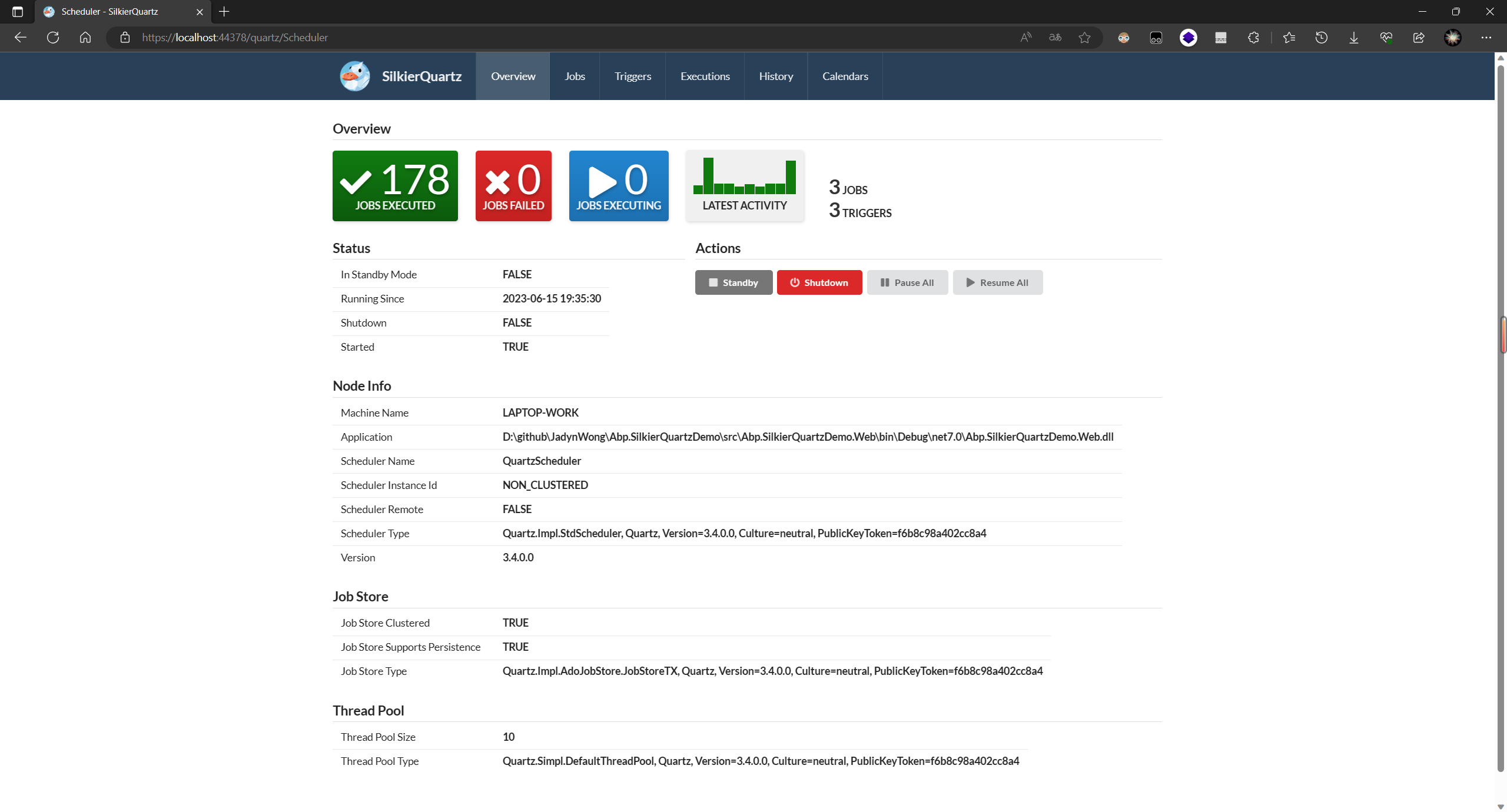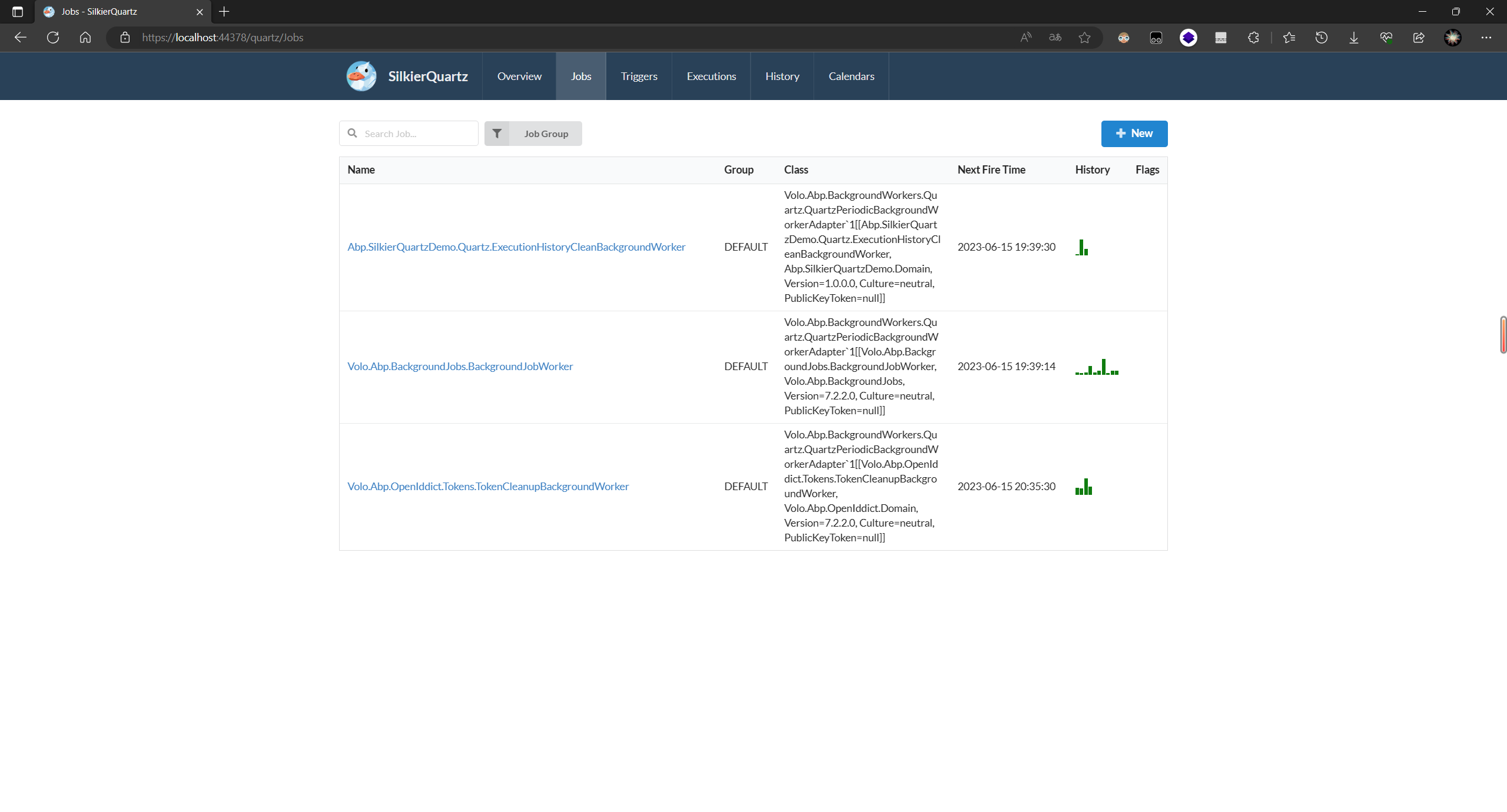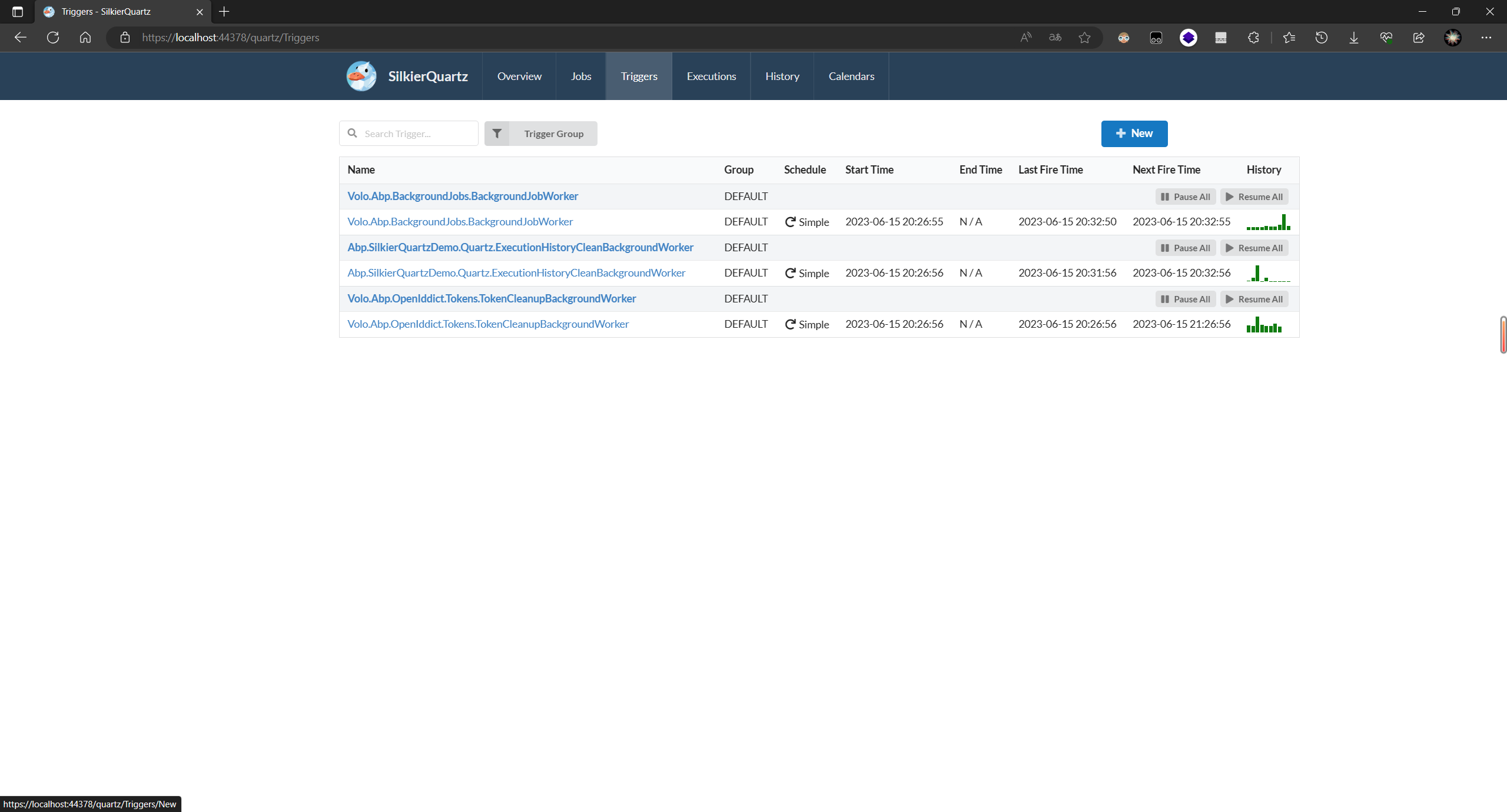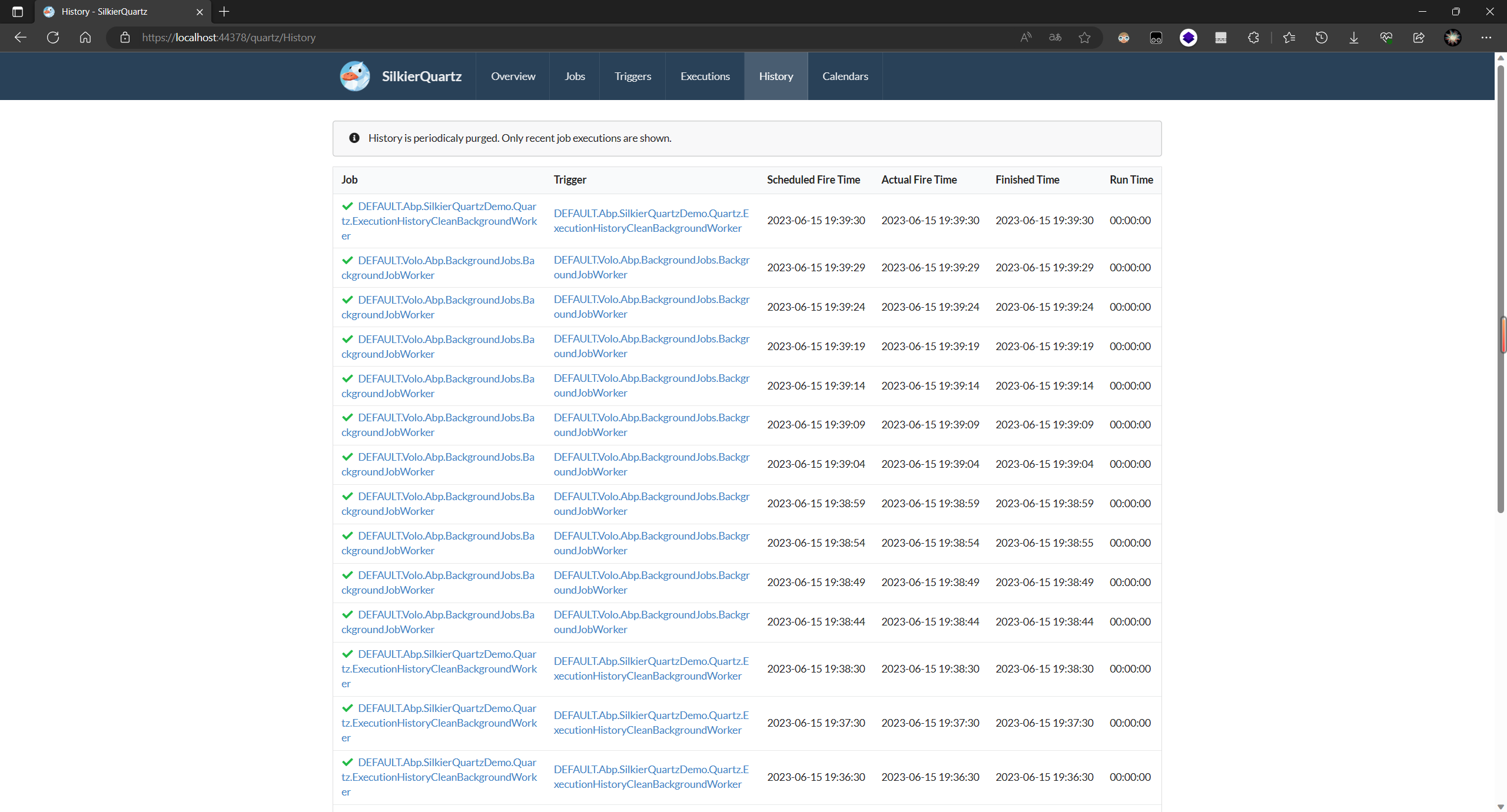Manage Quartz with SilkierQuartz
Introduction
The ABP Framework supports using Quartz.Net as an implementation for BackgroundJob and BackgroundWorker. Quartz.Net offers better CRON format support (including seconds), more powerful triggers, calendars, and so on compared to Hangfire. However, unfortunately, it does not come with a ready-to-use dashboard like Hangfire does. This article will introduce how you can achieve a similar experience by utilizing SilkierQuartz.
SilkierQuartz based from Quartzmin.
With SilkierQuartz, we gain access to a feature-rich Dashboard to manage our jobs and execution history.

Initialization project
- Create the project, then run
DbMigrator
abp new Abp.SilkierQuartzDemo -t app
- Add Quartz's BackgroundJob and BackgroundWorker implementation packages to
Abp.SilkierQuartzDemo.Web.
abp add-package Volo.Abp.BackgroundJobs.Quartz
abp add-package Volo.Abp.BackgroundWorkers.Quartz
dotnet add package Quartz.Serialization.Json --version 3.4.0 # Match Volo.Abp.Quartz's Quartz version
- Configuring Quartz to use SqlServer persistence jobs
public override void PreConfigureServices(ServiceConfigurationContext context)
{
var configuration = context.Services.GetConfiguration();
...
PreConfigure<AbpQuartzOptions>(options =>
{
options.Configurator = configure =>
{
configure.UsePersistentStore(storeOptions =>
{
storeOptions.UseProperties = true;
storeOptions.UseJsonSerializer();
storeOptions.UseSqlServer(configuration.GetConnectionString("Default")!);
storeOptions.UseClustering(c =>
{
c.CheckinMisfireThreshold = TimeSpan.FromSeconds(20);
c.CheckinInterval = TimeSpan.FromSeconds(10);
});
});
};
});
}
For detailed configuration, please see documentation
Select your database type, initialize the Quartz database table. https://github.com/quartznet/quartznet/tree/main/database/tables
Installing SilkierQuartz
- Install
SilkierQuartztoAbp.SilkierQuartzDemo.Web
dotnet add package SilkierQuartz --version 5.0.356
- Add
AbpSilkierQuartzExtensions.cstoAbp.SilkierQuartzDemo.Web
public static class AbpSilkierQuartzExtensions
{
private const string DefaultVirtualPathRoot = "/quartz";
public static IApplicationBuilder UseAbpSilkierQuartz(
this IApplicationBuilder app,
Action<SilkierQuartz.SilkierQuartzOptions>? actionOptions = null)
{
var options = new SilkierQuartz.SilkierQuartzOptions()
{
Logo = app.ApplicationServices.GetRequiredService<IBrandingProvider>().LogoUrl ?? "Content/Images/logo.png",
Scheduler = app.ApplicationServices.GetRequiredService<IScheduler>(),
VirtualPathRoot = DefaultVirtualPathRoot,
UseLocalTime = true,
DefaultDateFormat = "yyyy-MM-dd",
DefaultTimeFormat = "HH:mm:ss",
CronExpressionOptions = new CronExpressionDescriptor.Options()
{
DayOfWeekStartIndexZero = false //Quartz uses 1-7 as the range
}
};
actionOptions?.Invoke(options);
var fsOptions = new FileServerOptions()
{
RequestPath = new PathString($"{options.VirtualPathRoot}/Content"),
EnableDefaultFiles = false,
EnableDirectoryBrowsing = false,
FileProvider = new EmbeddedFileProvider(typeof(SilkierQuartz.SilkierQuartzOptions).Assembly, "SilkierQuartz.Content")
};
app.UseFileServer(fsOptions);
var services = SilkierQuartz.Services.Create(options, null);
app.Use(async (context, next) =>
{
context.Items[typeof(SilkierQuartz.Services)] = services;
await next();
});
return app;
}
public static void MapAbpSilkierQuartz(this IEndpointRouteBuilder routeBuilder, string virtualPathRoot = DefaultVirtualPathRoot)
{
routeBuilder.MapControllerRoute(nameof(SilkierQuartz), $"{virtualPathRoot}/{{controller=Scheduler}}/{{action=Index}}");
}
}
- Configure
ProjectNameWebModule, skip anti-forgery validation forSilkierQuartzcontrollers, configure routing.
...
public class SilkierQuartzDemoWebModule : AbpModule
{
public override void ConfigureServices(ServiceConfigurationContext context)
{
...
Configure<AbpAntiForgeryOptions>(options =>
{
options.AutoValidateFilter = type => !type.FullName!.StartsWith("SilkierQuartz.Controllers");
});
}
public override void OnApplicationInitialization(ApplicationInitializationContext context)
{
var app = context.GetApplicationBuilder();
...
app.UseAbpSilkierQuartz();
app.UseConfiguredEndpoints(endpoints =>
{
endpoints.MapAbpSilkierQuartz();
});
}
}
- Configure permission in
ProjectNamePermissionDefinitionProvider
public override void Define(IPermissionDefinitionContext context)
{
var myGroup = context.AddGroup(SilkierQuartzDemoPermissions.GroupName);
// Permission name must be 'SilkierQuartz'
myGroup.AddPermission("SilkierQuartz", L("Permission:SilkierQuartz"));
...
}
Run
DbMigratorStart and visit, 'https://your-host/quartz'. Now you can get a basic preview of SilkierQuartz.
Implementation of ExecutionHistory persistence
The default SilkierQuartz execution hostory is implemented using in-memory. We can implement database persistence via abp.
Due to the large amount of code, only the important parts are shown below, for details please refer to commit
- Add
SilkierQuartz.Plugins.RecentHistorytoAbp.SilkierQuartzDemo.Domain
dotnet add package SilkierQuartz.Plugins.RecentHistory
- Creating the Quartz directory in
Abp.SilkierQuartzDemo.Domain, add the entitiesQuartzJobSummaryandQuartzExecutionHistory
public class QuartzExecutionHistory : BasicAggregateRoot<Guid>
{
public string FireInstanceId { get; protected set; } = null!;
public string SchedulerInstanceId { get; set; } = null!;
public string SchedulerName { get; set; } = null!;
public string? Job { get; set; }
public string? Trigger { get; set; }
public DateTime? ScheduledFireTimeUtc { get; set; }
public DateTime ActualFireTimeUtc { get; set; }
public bool Recovering { get; set; }
public bool Vetoed { get; set; }
public DateTime? FinishedTimeUtc { get; set; }
public string? ExceptionMessage { get; set; }
protected QuartzExecutionHistory()
{
}
public QuartzExecutionHistory(Guid id, string fireInstanceId) : base(id)
{
FireInstanceId = fireInstanceId;
}
}
public class QuartzJobSummary : BasicAggregateRoot<Guid>
{
public string SchedulerName { get; protected set; } = null!;
public int TotalJobsExecuted { get; set; }
public int TotalJobsFailed { get; set; }
protected QuartzJobSummary()
{
}
public QuartzJobSummary(Guid id, string schedulerName) : base(id)
{
SchedulerName = schedulerName;
}
}
- Add
IQuartzExecutionHistoryRepositoryandIQuartzJobSummaryRepositoryinterfaces, and implement them in EntityFrameworkCore.
public interface IQuartzExecutionHistoryRepository : IBasicRepository<QuartzExecutionHistory, Guid>
{
Task<QuartzExecutionHistory?> FindByFireInstanceIdAsync(string fireInstanceId, CancellationToken cancellationToken = default);
Task<List<QuartzExecutionHistory>> GetLastOfEveryJobAsync(string schedulerName, int limitPerJob, CancellationToken cancellationToken = default);
Task<List<QuartzExecutionHistory>> GetLastOfEveryTriggerAsync(
string schedulerName,
int limitPerTrigger,
int skipPerTrigger = 0,
CancellationToken cancellationToken = default);
Task<List<QuartzExecutionHistory>> GetLastAsync(string schedulerName, int limit, CancellationToken cancellationToken = default);
Task PurgeAsync(CancellationToken cancellationToken = default);
}
public interface IQuartzJobSummaryRepository : IBasicRepository<QuartzJobSummary, Guid>
{
Task<QuartzJobSummary?> FindBySchedulerNameAsync(string schedulerName, CancellationToken cancellationToken = default);
Task<int> GetTotalJobsExecutedAsync(string schedulerName, CancellationToken cancellationToken = default);
Task<int> GetTotalJobsFailedAsync(string schedulerName, CancellationToken cancellationToken = default);
Task IncrementTotalJobsExecutedAsync(string schedulerName, CancellationToken cancellationToken = default);
Task IncrementTotalJobsFailedAsync(string schedulerName, CancellationToken cancellationToken = default);
}
- Configure
ProjectNameDbContext
protected override void OnModelCreating(ModelBuilder builder)
{
...
builder.Entity<QuartzExecutionHistory>(b =>
{
b.ToTable("QuartzExecutionHistories", SilkierQuartzDemoConsts.DbSchema);
b.ConfigureByConvention();
/* Configure more properties here */
b.Property(x => x.FireInstanceId).HasMaxLength(200);
b.Property(x => x.SchedulerInstanceId).HasMaxLength(200);
b.Property(x => x.SchedulerName).HasMaxLength(200);
b.Property(x => x.Job).HasMaxLength(300);
b.Property(x => x.Trigger).HasMaxLength(300);
b.HasIndex(x => x.FireInstanceId);
});
builder.Entity<QuartzJobSummary>(b =>
{
b.ToTable("QuartzJobSummares", SilkierQuartzDemoConsts.DbSchema);
b.ConfigureByConvention();
/* Configure more properties here */
b.Property(x => x.SchedulerName).HasMaxLength(200);
});
}
- Add
AbpExecutionHistoryStoreto implementIExecutionHistoryStore.
public class AbpExecutionHistoryStore : IExecutionHistoryStore, ISingletonDependency
{
public string SchedulerName { get; set; } = null!;
protected IServiceScopeFactory ServiceScopeFactory = null!;
public ILogger<AbpExecutionHistoryStore> Logger { get; set; }
public AbpExecutionHistoryStore()
{
Logger = NullLogger<AbpExecutionHistoryStore>.Instance;
}
public AbpExecutionHistoryStore(
IServiceScopeFactory serviceScopeFactory) : this()
{
ServiceScopeFactory = serviceScopeFactory;
}
public async Task<ExecutionHistoryEntry?> Get(string fireInstanceId)
{
using var scope = ServiceScopeFactory.CreateScope();
var repository = scope.ServiceProvider.GetRequiredService<IQuartzExecutionHistoryRepository>();
var quartzJobHistory = await repository.FindByFireInstanceIdAsync(fireInstanceId);
if (quartzJobHistory == null)
{
return null;
}
return quartzJobHistory.ToEntry();
}
public async Task Purge()
{
using var scope = ServiceScopeFactory.CreateScope();
var repository = scope.ServiceProvider.GetRequiredService<IQuartzExecutionHistoryRepository>();
await repository.PurgeAsync();
}
public async Task Save(ExecutionHistoryEntry entry)
{
using var scope = ServiceScopeFactory.CreateScope();
var guidGenerator = scope.ServiceProvider.GetRequiredService<IGuidGenerator>();
var repository = scope.ServiceProvider.GetRequiredService<IQuartzExecutionHistoryRepository>();
var quartzJobHistory = await repository.FindByFireInstanceIdAsync(entry.FireInstanceId);
if (quartzJobHistory == null)
{
quartzJobHistory = entry.ToEntity(new QuartzExecutionHistory(guidGenerator.Create(), entry.FireInstanceId));
await repository.InsertAsync(quartzJobHistory);
}
else
{
quartzJobHistory = entry.ToEntity(quartzJobHistory);
await repository.UpdateAsync(quartzJobHistory);
}
}
public async Task<IEnumerable<ExecutionHistoryEntry>> FilterLastOfEveryJob(int limitPerJob)
{
using var scope = ServiceScopeFactory.CreateScope();
var repository = scope.ServiceProvider.GetRequiredService<IQuartzExecutionHistoryRepository>();
var quartzJobHistories = await repository.GetLastOfEveryJobAsync(SchedulerName, limitPerJob);
return quartzJobHistories.Select(x => x.ToEntry());
}
public async Task<IEnumerable<ExecutionHistoryEntry>> FilterLastOfEveryTrigger(int limitPerTrigger)
{
using var scope = ServiceScopeFactory.CreateScope();
var repository = scope.ServiceProvider.GetRequiredService<IQuartzExecutionHistoryRepository>();
var quartzJobHistories = await repository.GetLastOfEveryTriggerAsync(SchedulerName, limitPerTrigger);
return quartzJobHistories.Select(x => x.ToEntry());
}
public async Task<IEnumerable<ExecutionHistoryEntry>> FilterLast(int limit)
{
using var scope = ServiceScopeFactory.CreateScope();
var repository = scope.ServiceProvider.GetRequiredService<IQuartzExecutionHistoryRepository>();
var quartzJobHistories = await repository.GetLastAsync(SchedulerName, limit);
return quartzJobHistories.Select(x => x.ToEntry());
}
public async Task<int> GetTotalJobsExecuted()
{
using var scope = ServiceScopeFactory.CreateScope();
var repository = scope.ServiceProvider.GetRequiredService<IQuartzJobSummaryRepository>();
return await repository.GetTotalJobsExecutedAsync(SchedulerName);
}
public async Task<int> GetTotalJobsFailed()
{
using var scope = ServiceScopeFactory.CreateScope();
var repository = scope.ServiceProvider.GetRequiredService<IQuartzJobSummaryRepository>();
return await repository.GetTotalJobsFailedAsync(SchedulerName);
}
public async Task IncrementTotalJobsExecuted()
{
using var scope = ServiceScopeFactory.CreateScope();
var repository = scope.ServiceProvider.GetRequiredService<IQuartzJobSummaryRepository>();
await repository.IncrementTotalJobsExecutedAsync(SchedulerName);
}
public async Task IncrementTotalJobsFailed()
{
using var scope = ServiceScopeFactory.CreateScope();
var repository = scope.ServiceProvider.GetRequiredService<IQuartzJobSummaryRepository>();
await repository.IncrementTotalJobsFailedAsync(SchedulerName);
}
public virtual async Task InitializeSummaryAsync()
{
using var scope = ServiceScopeFactory.CreateScope();
var unitOfWorkManager = scope.ServiceProvider.GetRequiredService<IUnitOfWorkManager>();
var repository = scope.ServiceProvider.GetRequiredService<IQuartzJobSummaryRepository>();
var guidGenerator = scope.ServiceProvider.GetRequiredService<IGuidGenerator>();
using var uow = unitOfWorkManager.Begin(true);
var quartzJobSummary = await repository.FindBySchedulerNameAsync(SchedulerName);
if (quartzJobSummary == null)
{
quartzJobSummary = new QuartzJobSummary(guidGenerator.Create(), SchedulerName);
await repository.InsertAsync(quartzJobSummary);
}
await uow.CompleteAsync();
}
}
- Add
AbpExecutionHistoryPluginto implementISchedulerPlugin,IJobListener
public class AbpExecutionHistoryPlugin : ISchedulerPlugin, IJobListener
{
private IScheduler _scheduler = null!;
private IExecutionHistoryStore _store = null!;
public Type StoreType { get; set; } = null!;
public string Name { get; protected set; } = string.Empty;
public Task Initialize(string pluginName, IScheduler scheduler, CancellationToken cancellationToken = default)
{
Name = pluginName;
_scheduler = scheduler;
_scheduler.ListenerManager.AddJobListener(this, EverythingMatcher<JobKey>.AllJobs());
return Task.FromResult(0);
}
public async Task Start(CancellationToken cancellationToken = default)
{
_store = _scheduler.Context.GetExecutionHistoryStore();
if (_store == null)
{
throw new AbpException(nameof(StoreType) + " is not set.");
}
_store.SchedulerName = _scheduler.SchedulerName;
if (_store is AbpExecutionHistoryStore abpStore)
await abpStore.InitializeSummaryAsync();
await _store.Purge();
}
public Task Shutdown(CancellationToken cancellationToken = default)
{
return Task.CompletedTask;
}
public async Task JobToBeExecuted(IJobExecutionContext context, CancellationToken cancellationToken = default)
{
var entry = new ExecutionHistoryEntry()
{
FireInstanceId = context.FireInstanceId,
SchedulerInstanceId = context.Scheduler.SchedulerInstanceId,
SchedulerName = context.Scheduler.SchedulerName,
ActualFireTimeUtc = context.FireTimeUtc.UtcDateTime,
ScheduledFireTimeUtc = context.ScheduledFireTimeUtc?.UtcDateTime,
Recovering = context.Recovering,
Job = context.JobDetail.Key.ToString(),
Trigger = context.Trigger.Key.ToString(),
};
await _store.Save(entry);
}
public async Task JobWasExecuted(IJobExecutionContext context, JobExecutionException? jobException, CancellationToken cancellationToken = default)
{
var entry = await _store.Get(context.FireInstanceId);
if (entry != null)
{
entry.FinishedTimeUtc = DateTime.UtcNow;
entry.ExceptionMessage = jobException?.GetBaseException()?.ToString();
}
else
{
entry = new ExecutionHistoryEntry()
{
FireInstanceId = context.FireInstanceId,
SchedulerInstanceId = context.Scheduler.SchedulerInstanceId,
SchedulerName = context.Scheduler.SchedulerName,
ActualFireTimeUtc = context.FireTimeUtc.UtcDateTime,
ScheduledFireTimeUtc = context.ScheduledFireTimeUtc?.UtcDateTime,
Recovering = context.Recovering,
Job = context.JobDetail.Key.ToString(),
Trigger = context.Trigger.Key.ToString(),
FinishedTimeUtc = DateTime.UtcNow,
ExceptionMessage = jobException?.GetBaseException()?.ToString()
};
}
await _store.Save(entry);
if (jobException == null)
await _store.IncrementTotalJobsExecuted();
else
await _store.IncrementTotalJobsFailed();
}
public async Task JobExecutionVetoed(IJobExecutionContext context, CancellationToken cancellationToken = default)
{
var entry = await _store.Get(context.FireInstanceId);
if (entry != null)
{
entry.Vetoed = true;
await _store.Save(entry);
}
}
}
- Add
ExecutionHistoryCleanBackgroundWorkerbackground worker, used to clean up execution history
public class ExecutionHistoryCleanBackgroundWorker : AsyncPeriodicBackgroundWorkerBase, ITransientDependency
{
public ExecutionHistoryCleanBackgroundWorker(AbpAsyncTimer timer, IServiceScopeFactory serviceScopeFactory)
: base(timer, serviceScopeFactory)
{
Timer.Period = 1000 * 60; //1 minutes
}
protected override async Task DoWorkAsync(PeriodicBackgroundWorkerContext workerContext)
{
Logger.LogDebug("ExecutionHistoryCleanBackgroundWorker executing");
await LazyServiceProvider
.LazyGetRequiredService<AbpExecutionHistoryStore>()
.Purge();
Logger.LogDebug("ExecutionHistoryCleanBackgroundWorker executed");
}
}
- Register
ExecutionHistoryCleanBackgroundWorkerand configureExecutionHistoryStore.
public class SilkierQuartzDemoDomainModule : AbpModule
{
...
public override void OnPreApplicationInitialization(ApplicationInitializationContext context)
{
var scheduler = context.ServiceProvider.GetRequiredService<IScheduler>();
var executionHistoryStore = context.ServiceProvider.GetRequiredService<AbpExecutionHistoryStore>();
scheduler.Context.SetExecutionHistoryStore(executionHistoryStore);
}
public override async Task OnApplicationInitializationAsync(ApplicationInitializationContext context)
{
await base.OnApplicationInitializationAsync(context);
await context.AddBackgroundWorkerAsync<ExecutionHistoryCleanBackgroundWorker>();
}
}
- Modify the
AbpQuartzOptionsconfiguration to register our persistence implementation
PreConfigure<AbpQuartzOptions>(options =>
{
options.Configurator = configure =>
{
+ configure.SetProperty("quartz.plugin.recentHistory.type", typeof(AbpExecutionHistoryPlugin).AssemblyQualifiedNameWithoutVersion());
+ configure.SetProperty("quartz.plugin.recentHistory.storeType", typeof(AbpExecutionHistoryStore).AssemblyQualifiedNameWithoutVersion());
configure.UsePersistentStore(storeOptions =>
{
storeOptions.UseProperties = true;
storeOptions.UseJsonSerializer();
storeOptions.UseSqlServer(configuration.GetConnectionString("Default")!);
storeOptions.UseClustering(c =>
{
c.CheckinMisfireThreshold = TimeSpan.FromSeconds(20);
c.CheckinInterval = TimeSpan.FromSeconds(10);
});
});
};
});
- Add migration in EntityFramework project and apply them to database
dotnet ef migrations add Added_QuartzRecentHistory
dotnet ef database update
- Start and visit 'https://your-host/quartz/History'. Now you can view the execution history.
Preview
Overview

Jobs

Triggers

Hostory


jcavi7395@gmail.com 43 weeks ago
Are you prepared for a journey down memory lane and the opportunity to play the original.
Jack Fistelmann 42 weeks ago
Thank you for this tutorial :) Did not know of SilkierQuartz
Joe Larson 33 weeks ago
I pulled down the project from Github and I got an error in the DomainModule in the OnPreApplicationInitialization method, when trying to get the scheduler service. Below is the error.
Autofac.Core.Registration.ComponentNotRegisteredException HResult=0x80131500 Message=The requested service 'Quartz.IScheduler' has not been registered. To avoid this exception, either register a component to provide the service, check for service registration using IsRegistered(), or use the ResolveOptional() method to resolve an optional dependency.
Source=Autofac StackTrace: at Autofac.ResolutionExtensions.ResolveService(IComponentContext context, Service service, IEnumerable
1 parameters) at Autofac.ResolutionExtensions.Resolve(IComponentContext context, Type serviceType, IEnumerable1 parameters) at Autofac.ResolutionExtensions.Resolve(IComponentContext context, Type serviceType) at Autofac.Extensions.DependencyInjection.AutofacServiceProvider.GetRequiredService(Type serviceType) at Microsoft.Extensions.DependencyInjection.ServiceProviderServiceExtensions.GetRequiredService(IServiceProvider provider, Type serviceType) at Microsoft.Extensions.DependencyInjection.ServiceProviderServiceExtensions.GetRequiredService[T](IServiceProvider provider) at Abp.SilkierQuartzDemo.SilkierQuartzDemoDomainModule.OnPreApplicationInitialization(ApplicationInitializationContext context) in C:\Users\JLarson\source\repos\GitHub\Abp.SilkierQuartzDemo\src\Abp.SilkierQuartzDemo.Domain\SilkierQuartzDemoDomainModule.cs:line 77 at Volo.Abp.Modularity.AbpModule.OnPreApplicationInitializationAsync(ApplicationInitializationContext context) at Volo.Abp.Modularity.OnPreApplicationInitializationModuleLifecycleContributor.<InitializeAsync>d__0.MoveNext()Jadyn 33 weeks ago
Thanks for the feedback, you can try pulling the latest code. If you have any questions, you can send me feedback via github issue.